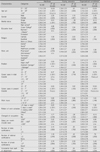Abstract
Purpose
This descriptive correlation study was done to identify the hardiness, coping behavior, and organizational commitment of general hospital employees and show how these variables affect increases in role performance and problem solving ability to have a positive influence on organizational harmony.
Methods
A quantitative, descriptive research design was used with a sample of 368 employees working in general hospitals in M and C cities. A survey was used to collect the data.
Results
The score for perception of hardiness of general hospital employees was 2.85, and coping behavior was 2.40, both out of a possible 4 points, and organizational commitment, 3.03 out of a possible 5 points. There were statistically significant positive correlations between hardiness and coping behavior (r=.33, p<.001), also between hardiness and organizational commitment (r=.51, p<.001), and also between coping behavior and organizational commitment (r=.22, p<.001).
Conclusion
The results of the study indicate that hardiness, coping behavior, and organizational commitment in general hospital employees have positive correlations, and thus hospital administrators should explore ways of increase individual employee hardiness and coping behavior, and make efforts to harmonize their organizations by enhancing organizational commitment.
Figures and Tables
Table 2
The Degree of Hardiness, Coping Behaviors and Organizational Commitment of Participants (N=368)

References
1. Bartone PT. A short hardiness scale. Paper presented at the Annual Convention of the American Psychological Society. 1995, July; New York.
2. Choi IK, Koh MS. A study on the role conflict and ways of coping of underwriters worked at life insurance companies in Korea. J Korean Acad Nurs Adm. 2003. 9:615–624.
3. Cho JY. A study on relationships among responses of violence experience, hardiness and job satisfaction in emergency department nurses. 2011. Incheon, Korea: Inha University;Unpublished master's thesis.
4. Faul F, Erdfelder E, Buchner A, Lang A. Statistical power analyses using G*Power 3.1: Tests for correlation and regression analysis. Behav Res Methods. 2009. 41(4):1149–1160. http://dx.doi.org/10.3758/BRM.41.4.1149.
5. Ha NS, Choi J, Lee YM, Im MY, Lee KE, Kil SY, et al. The effect of stress management program on the perceived stress, stress response, ways of coping of nurses. J Korean Acad Nurs Adm. 2002. 8:31–44.
6. Han JS, Oh KS. A study on the grief and coping pattern of mothers who have a chronically ill child. Korean Nurse. 1990. 29(4):73–87.
7. Han YH, Sohn IS, Park KO, Kang KH. The relationships between professionalism, job involvement, organizational commitment and turnover intention among clinical nurses. J Korean Clin Nurs Res. 2010. 16(2):17–31.
8. Judkins SK, Ingram M. Decreasing stress among nurse managers: A long-term solution. J Contin Educ Nurs. 2002. 33:259–264.
9. Judkins SK, Reid B, Furlow L. Hardiness training among nurse managers: Building a healthy workplace. J Contin Educ Nurs. 2006. 37(5):202–207.
10. Kim JS. Relationship between work stress and organizational commitment of nurses according to hardiness and coping. J Kyungpook Nurs Sci. 2001. 5(2):1–18.
11. Kim JH, Park SA. The relationship between coping strategies and a nursing organizational effectiveness in staff nurses. J Korean Acad Nurs Adm. 2002. 8:97–105.
12. Kim MS, Park YB. The influence of organizational justice on job involvement and organizational commitment perceived by nurses. J Korean Acad Nurs Adm. 2006. 12:32–40.
13. Kim NS. Health promoting behaviors and influencing factors of university students: optimism and coping skills. J Korean Acad Adult Nurs. 2007. 19:719–728.
14. Kobasa S, Maddi S, Kahn S. Hardiness and health: A prospective study. J Pers Soc Psychol. 1982. 42:168–177.
15. Lazarus RS, Folkman S. Stress, appraisal and coping. 1984. New York: Springer Publishing Company.
16. Lee CH. Mental Health and Effect of Anger-Control Program for Prison Inmates. 2005. Jinju, Korea: Gyeongsang National University;Unpublished master's thesis.
17. Lee SY. The relationships of superiors leadership to supervisory trust and organizational commitment of nurses. J Korean Acad Nurs Adm. 2007. 13:208–218.
18. Lim DS, Cho BH. The study on stress, hardiness, and professional burnout of intensive care unit nurses. J Korean Acad Fundam Nurs. 2007. 14:120–127.
19. Moon SJ, Han SS. The prediction factor on organizational commitment of the nurse. J Korean Acad Soc Nurs Educ. 2009. 15:72–80.
20. Mowday RT, Steers RM, Porter LW. The measurement of organizational commitment. J Vocat Behav. 1979. 14:142–147. 224–247.
21. Park GJ, Kim YN. Factors influencing organizational commitment among hospital nurses. J Korean Acad Nurs Adm. 2010. 16:250–258.
22. Park HS. The influence of compensation justice on job satisfaction and organizational commitment perceived by hospital personnels. J Korean Acad Nurs Adm. 2007. 13:492–500.
23. Park JS. The impact of workplace empowerment on university hospital administrative staff's job satisfaction and organizational commitment. Korean J Hosp Manage. 2002. 7:1–18.
24. Thomsen TG, Rydahl-Hansen S, Wagner L. A review of potential factors relevant to coping in patients with advanced cancer. J Clin Nurs. 2010. 19:3410–3426.
25. Yang JH, Jung HY. Relationship between violence response, coping, and burnout among emergency department nurses. J Korean Acad Fundam Nurs. 2009. 16(1):103–111. http://dx.doi.org/10.1111/j.1365-2702.2009.03154.x.
26. Yoon SH, Kim BS. New graduate nurses' stress, stress coping, adaptation to work, and job satisfaction: Change comparison by personality. J Korean Acad Nurs Adm. 2006. 12:491–500.




 PDF
PDF ePub
ePub Citation
Citation Print
Print






 XML Download
XML Download